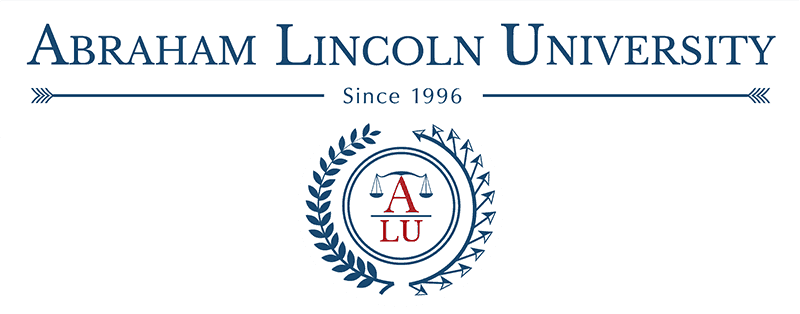There are so many questions to ask when deciding to attend law school — “Should I go to law school?”, “Is a law degree worth it?”, “Will I survive as a non-traditional student?”. One of the best sources for answers to these questions is someone who’s been there. Read and watch as Abraham Lincoln University School of Law graduate Barrett Vaughn shares his experience.
Barrett earned his B.S. in Agricultural Engineering from Michigan State University and his Ph.D. in Agricultural and Biological Engineering from Pennsylvania State University. During his undergraduate years, he discovered that many of his older classmates planned to continue on to law school after graduation. Considering the career benefits of a legal education, he eventually took the LSAT. Twenty years or so later, he finally decided to start earning his J.D. He wasn’t about to give up his career as a professor though, which is what lead him to research online law school options.
Good afternoon, my name is Barrett Vaughn. I’m a graduate of the Juris Doctor program here at Abraham Lincoln University in 2019. I’m originally from Detroit, Michigan and I work as a professor in Alabama and I am currently just starting with an intellectual property program — the LLM program — at Cooley Law School at Lansing, Michigan.
As a professor at Tuskegee, what inspired you to pursue a degree in law, something so different than your previous areas of study?
Well, when I was an undergraduate at Michigan State, I had two options after I did my undergraduate in engineering. Either for graduate school to pursue a doctoral program or to go to law school. At the time, I chose graduate school — so that was about 25 years before I started at ALU. With the advent of online education I found out — in 2013 — that I could actually go back to law school which was one of my other options.
And I pursued it with a couple of different schools and had some very good counsel from a lot of different schools. But the school that interested me most was Abraham Lincoln University because they had small class size and actually synchronous courses instead of asynchronous — which means that they were live courses that you’re actually able to talk to Professor and not just watching tapes.
And also they have a lot of student support in terms of academic support programs. You were able to actually get in contact with your professors outside of class, and you could also build relationships with the other students because you were really communicating with them in real time. So that was really impressive to me because it was more like being in class. As a result, I’ve built a lot of friendships with people because I could actually talk directly to them — because we were all in class at the same time, which was really more beneficial. There’s the face-to-face, you know, brick-and-mortar experience for me.
What was it like representing ALU at the national DTP convention in Louisiana this past year?
That was really wonderful. I’m glad that the faculty at ALU pursued getting us into the law fraternity. There are several that are out there, and there’s three major ones, and Delta Theta Phi is probably one of the better ones.
They really welcomed us with open arms. I was really impressed by that because I’m not part of a Greek letter organization from undergrad. So this was actually the only Greek letter organization that I’ve been a part of that’s a fraternal organization. And the conference in New Orleans really was more of a working conference. They got a select group of the delegates from each of the chapters — or senates is what they call them — and they work on different projects. So since we got there, we had a computer and we were assigned to do different tasks — in terms of management of the organization. But there was a lot of brotherhood and a sisterhood camaraderie. It is a co-ed fraternity — at least they call it a fraternity. So I made a lot of friends. We keep in contact with each other on Facebook. There are a few chapters that are in Alabama and so a number of the people I do sort of keep in contact with. So it was a really good experience.
One of the things that I thought was great is that in terms of going to school online you do — even though you’re in class — there still is that connection that you really do like to have. So it really provided this opportunity to make friends outside of just that class — that are doing professional things. And they’re in, you know, California, New York, or Michigan, or wherever they are. So it really was a good experience as a student to meet new people that are students.
And one of the things is that a lot of the students are more traditional, but we were probably the most (Dr. Dona and myself) were probably the most non-traditional students there. It was an excellent experience for both of us.
What types of roles are you looking to occupy? Do you see yourself in activism in relation to your background in sustainable technology and practices in agriculture?
Well, within intellectual property law, one of the reasons I was really interested in is that it’s really a law that’s at the federal level for the most part. So there’s patent trademarks and copyrights. And right now I’m with a program that actually is synchronous which means that you have to be in the class at the time the professor’s teaching — which pretty much was continuing the training that I had here, but I can practice it in Alabama as long as I pass a Federal Bar — I’m sorry — the California Bar — and then obtain Federal Bar membership so I can actually start to practice while I am in Alabama.
There are a number of different states that have been changing the rules as regard to non-ABA accredited, say California unaccredited, approved law schools. So hopefully over the next few years things will change, but as of right now I can practice federally, which is an area that I was interested in actually back in undergrad. Because with an engineering background, patent law, environmental law — those are some of the areas that are most suitable for people with these science backgrounds.
In what important ways does online education differ from on-site education?
Well one of the things is I think that with the synchronous technology there’s a lot that is made up between sitting and watching videos and doing homework, or even just getting a list of assignments to do, and doing those, and actually being in class with a professor that you can see that is actually answering questions as you have them. And I think that there’s a big difference.
When it comes, of course, to you know brick-and-mortar, face-to-face, you have that experience of being in class and you can interact with the students. But I think what the use of the technology has given is that it’s giving a good analog to go into that — because you still are able to see the professor you still are able to ask questions. You still are able to interact with other students and I think that that’s the benefit. Yes, there are some you know, ‘disconnect-its’ there because you’re not really there — you’re not really able to see the other students. But in terms of being able to interact with the professor it’s really great.
One of the things that I notice is there are programs out there that basically you’re watching videos. Well, I mean it’s one thing to say watch the video, if you have any questions, go ahead and send us an email or address them. But I know at least from the collect four years of classes that I was at ALU, you know the professor is able to gauge your understanding from the questions and they can go back over certain topics and clarify those things as you’re actually going through the topic. So it’s not so much you go through the topic then ask a question.
The other thing that I found is that you’ll see a lot of people that are asking the same question — sometimes at the same time that they’re typing it into the system. And so that also gives the professor the opportunity to really see “okay everyone’s asking me this question”. Because if you have the question, others have the question. But if you don’t feel comfortable asking a question for whatever reasons you may have some experience about asking it, it’s almost certain that someone else is going to ask the question at the same time — which is good because that keeps everybody pretty much aligned.
So I think that even though the online has some restrictions obviously in terms of distance, and you know I still think that there’s a direct contact that you actually make with the professor and with other students that are good — and that’s good.
Would you say that the small class size contributes to that?
The small class size does help. If it was a larger class — sized say over 30 — I think that you would still have the same interaction. One of the things I know — under later courses that we did working groups. Trial Techniques we worked in groups. Constitutional Law some we worked in. So there is some group work and you’re able to interact with the students outside of class as well as for those together Trial Techniques. Even though it may seem rather odd compared to face-to-face, brick-and-mortar school. So how do you do that online? Well, use the technology.
And I think that if someone watched the videos of our class you would see that there you have defense counsel, you have, your you know, your plaintiff’s counsel, you have the judge, you have everything. We’re just not in a room, but you’re still having the same interaction.
So I think it does very well. The small class size really does help you.






